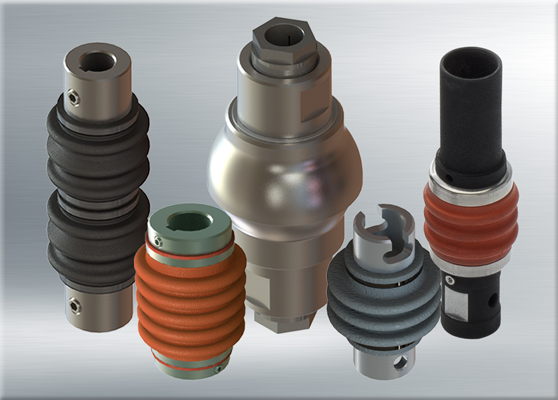Keeping universal joints fully lubricated reduces friction, wear and heat generation and can significantly prolong the useful life of the assembly. If pre-lubrication, such as in needle-bearing joints, or continuous lubrication with oil drips for example is not attainable, the joints can be fitted with lubricant-retaining boots (bellows).
In addition to maintaining component lubrication, boots can prevent contaminants entering and damaging the joints in environments polluted with chips, dirt, acids and/or other abrasives.
Why Belden U Joint Boot Covers?
 Standard u joint boots are typically manufactured from Nitrile. However, special operating environments might require other boot materials and lubricants. Some universal joint boot materials are more heat resistant than others. Extreme high and low temperatures can cause changes in the material’s composition as well as make the boots contract and expand past an acceptable range. Boots can also crack at low temperatures or swell if submerged in fuel or exposed to other harsh chemicals. Such issues can cause oils from the grease to seep through the silicone. For such operating conditions the development of alternative u joint boot materials or special design engineering solutions may be necessary, e.g. metal boot covers, bootless universal joints, dry-film lubrication, etc.
Standard u joint boots are typically manufactured from Nitrile. However, special operating environments might require other boot materials and lubricants. Some universal joint boot materials are more heat resistant than others. Extreme high and low temperatures can cause changes in the material’s composition as well as make the boots contract and expand past an acceptable range. Boots can also crack at low temperatures or swell if submerged in fuel or exposed to other harsh chemicals. Such issues can cause oils from the grease to seep through the silicone. For such operating conditions the development of alternative u joint boot materials or special design engineering solutions may be necessary, e.g. metal boot covers, bootless universal joints, dry-film lubrication, etc.
U Joint Boot Material Information:
- Nitrile (standard), also known as Buna-N, has excellent resistance to petroleum-based oils and fuels, silicone greases, hydraulic fluids, water and alcohol. It possesses high tensile strength and high abrasion resistance. Silicone boots are recommended for high temperature applications.
- Silicone (-SL) is resistant to high, dry heat. It is also fungus resistant, odorless, tasteless and non-toxic. It has a high resistance to the aging effects of both sunlight and ozone.
- Neoprene (-CR) was developed as an oil-resistant substitute for natural rubber. It features moderate resistance to petroleum oils and good resistance to ozone, sunlight, and oxygen aging. It has good resilience and is highly resistant to Freon® and Ammonia.
- Viton (-VT) combines high temperature toughness with wide chemical agent compatibility. It features excellent resistance to petroleum products and solvents.
- EPDM (-EPDM) has excellent ozone and chemical resistance. Effective resistance to steam up to 400 degrees Fahrenheit, hot water, silicone oils and greases, diluted acids and alkalis, alcohols and automotive break fluids.







